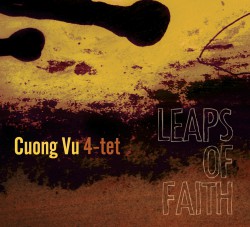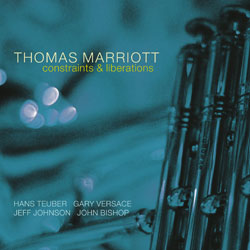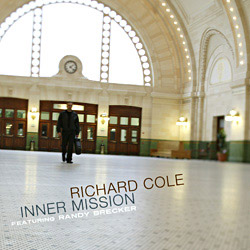from the March 2011 issue of Earshot Jazz:
Reptet, At the Cabin
Artist Recording Collective
 Reptet is less a jazz outfit than just what they are: skilled musicians with primarily Northwest-reared chops shaped over nearly a decade together. Reptet’s fourth release, At the Cabin, is out on the Artist Recording Collective label, a platform for member-based record promotion out of Kansas City. The release shows a hodgepodge of skills and styles, but members Samantha Boshnack (brass), Nelson Bell (brass), Chris Credit (winds), Izaak Mills (winds), Tim Carey (bass), and John Ewing (drums) do bring common references to the sextet. The multi-instrumentalists pull from among twenty-plus instruments and reference styles ranging from jazz, rock, and ska to avant-garde, punk, and eastern European folk music. With a plethora of performance timbres, At the Cabin stands out as snap shot of the band right now, a palm full of grooves showing each member’s character and performed as a group.
Reptet is less a jazz outfit than just what they are: skilled musicians with primarily Northwest-reared chops shaped over nearly a decade together. Reptet’s fourth release, At the Cabin, is out on the Artist Recording Collective label, a platform for member-based record promotion out of Kansas City. The release shows a hodgepodge of skills and styles, but members Samantha Boshnack (brass), Nelson Bell (brass), Chris Credit (winds), Izaak Mills (winds), Tim Carey (bass), and John Ewing (drums) do bring common references to the sextet. The multi-instrumentalists pull from among twenty-plus instruments and reference styles ranging from jazz, rock, and ska to avant-garde, punk, and eastern European folk music. With a plethora of performance timbres, At the Cabin stands out as snap shot of the band right now, a palm full of grooves showing each member’s character and performed as a group.
The record opens with somewhat of a suite of compositions by Boshnack. “Mayfield Safety” launches with strong marching drums from Ewing, above immovable bass brass licks from Bell and horns. The sextet shifts into an extended bridge section, then cools off and fizzles out on some skronk sax. Next is “Snow Leopard x3” and “Milky Shakes.” These first three tracks make full use of the sextet’s collective character, though do stand out stylistically as Boshnack’s – patient horn interplay supported by heavy bass grooves, some with structural rhythmic phrasings that lend a larger dimension than a sum of parts.
That character is especially present on “Snow Leopard x3” and later on Boshnack’s “Mock Arena,” a steady piece with clever, crunchy drum sounds from Ewing, and bright horns, all landing with an afrobeat vocabulary. The vibe allows soloists Bell and Mills to comment at leisure.
Further character shines on the record with Carey’s “Songitty Song” and the two Mills pieces at the end of the record. “Songitty Song” is a cohesive piece, as the name itself suggests, with a light Mingus quality. Mills brings another two clear musical points-of-view to the album. On “Trash Can Race,” the band thrashes somewhere between Zappa and Zorn, and Mills juxtaposes his flute solo over a gritty jam. After a string of rhythmic hits, the piece moves into a half-time psychedelia on the same riff, with some appropriate comping by guitar guest Mark Oi. Then “Pills” follows in the same vein but with a more ambitious time signature to riff on, vital for the ensemble, who delight in elements of the raucous eastern European folk marching music.
Reptet also delights in a particular brand of humor that surfaces on the record. Tracks “Milky Shakes” and “Agendacide,” for example, incorporate vocal riffs that seem to reference inside jokes. For a band whose existence spans eleven years, five in its current iteration, with a mix of musical personalities, a bit of home-cooked humor is likely a given. It doesn’t affect the overall appeal of the At the Cabin, and that humor is evidence of Reptet’s tendency to give permissions to each other that not all bands can afford. The result is a band difficult to qualify, but exciting in its potential to delight and surprise.
Don’t take this reviewer’s word for it: Reptet holds their At the Cabin CD release party on March 10 at the Tractor Tavern, 9pm. Eyvind Kang, Jessika Kenney, and Geoff Harper open.
 Nich Anderson, lauded vocalist with Seattle Jazz Singers, had two very big reasons to celebrate last months’s fantastic “Boys, Boys, Boys” concert, as part of the JazzVox house concert series, in Auburn, WA. Reason #1: It was a CD Release party for his stellar debut JazzVox CD “
Nich Anderson, lauded vocalist with Seattle Jazz Singers, had two very big reasons to celebrate last months’s fantastic “Boys, Boys, Boys” concert, as part of the JazzVox house concert series, in Auburn, WA. Reason #1: It was a CD Release party for his stellar debut JazzVox CD “ Most major American cities (and, for that matter, most European ones) contain a jazz musician who is the default bassist of record. You run into them all over town, in all manner of ensembles, kicking ass and taking names.
Most major American cities (and, for that matter, most European ones) contain a jazz musician who is the default bassist of record. You run into them all over town, in all manner of ensembles, kicking ass and taking names. Katy Bourne’s route to jazz has been peripatetic to say the least. Back in the 1980s, when her focus was fully on acting and writing, she bounced from Oklahoma to Iowa to New Mexico to the Northeast. In 1992 she took an extended break, re-emerging a few years later as lead singer for two Seattle-based blues bands. Soon afterward she discovered teacher Greta Matassa and concurrently unleashed her inner jazz stylist.
Katy Bourne’s route to jazz has been peripatetic to say the least. Back in the 1980s, when her focus was fully on acting and writing, she bounced from Oklahoma to Iowa to New Mexico to the Northeast. In 1992 she took an extended break, re-emerging a few years later as lead singer for two Seattle-based blues bands. Soon afterward she discovered teacher Greta Matassa and concurrently unleashed her inner jazz stylist. For its fourth album, the Jason Parker Quartet takes a sharp departure from its previous three efforts. Rather than simply cutting another solid straight-ahead quartet date, trumpeter Parker has added vocalist Michele Khazak, and multi-woodwind blower Cynthia Mullis, to reinterpret an entire folk-pop album: Nick Drake’s Five Leaves Left (Island Records, 1969). Despite being far outside the typical jazz cannon, Drake’s music continues to receive coverage from a number of jazz artists, including pianist Brad Mehldau, proving that unexpected choices can yield truly inspired performances, and Five Leaves Left is just that, in spades.
For its fourth album, the Jason Parker Quartet takes a sharp departure from its previous three efforts. Rather than simply cutting another solid straight-ahead quartet date, trumpeter Parker has added vocalist Michele Khazak, and multi-woodwind blower Cynthia Mullis, to reinterpret an entire folk-pop album: Nick Drake’s Five Leaves Left (Island Records, 1969). Despite being far outside the typical jazz cannon, Drake’s music continues to receive coverage from a number of jazz artists, including pianist Brad Mehldau, proving that unexpected choices can yield truly inspired performances, and Five Leaves Left is just that, in spades. Reptet is less a jazz outfit than just what they are: skilled musicians with primarily Northwest-reared chops shaped over nearly a decade together. Reptet’s fourth release, At the Cabin, is out on the Artist Recording Collective label, a platform for member-based record promotion out of Kansas City. The release shows a hodgepodge of skills and styles, but members Samantha Boshnack (brass), Nelson Bell (brass), Chris Credit (winds), Izaak Mills (winds), Tim Carey (bass), and John Ewing (drums) do bring common references to the sextet. The multi-instrumentalists pull from among twenty-plus instruments and reference styles ranging from jazz, rock, and ska to avant-garde, punk, and eastern European folk music. With a plethora of performance timbres, At the Cabin stands out as snap shot of the band right now, a palm full of grooves showing each member’s character and performed as a group.
Reptet is less a jazz outfit than just what they are: skilled musicians with primarily Northwest-reared chops shaped over nearly a decade together. Reptet’s fourth release, At the Cabin, is out on the Artist Recording Collective label, a platform for member-based record promotion out of Kansas City. The release shows a hodgepodge of skills and styles, but members Samantha Boshnack (brass), Nelson Bell (brass), Chris Credit (winds), Izaak Mills (winds), Tim Carey (bass), and John Ewing (drums) do bring common references to the sextet. The multi-instrumentalists pull from among twenty-plus instruments and reference styles ranging from jazz, rock, and ska to avant-garde, punk, and eastern European folk music. With a plethora of performance timbres, At the Cabin stands out as snap shot of the band right now, a palm full of grooves showing each member’s character and performed as a group. The voracious sweep of postmillennial jazz has plenty of exemplars but few truer than the trumpeter Cuong Vu. Over the last decade he has upheld a dreamlike sound informed by post-bop but just as rooted in noise pop, grunge and ambient minimalism. He has an invaluable partner in the bassist Stomu Takeishi, who shares his fluency with electronics and his fondness for immersive lyricism. Together with the smart young drummer Ted Poor they have tended to an aquatic, darkly inviting, calmly exploratory style.
The voracious sweep of postmillennial jazz has plenty of exemplars but few truer than the trumpeter Cuong Vu. Over the last decade he has upheld a dreamlike sound informed by post-bop but just as rooted in noise pop, grunge and ambient minimalism. He has an invaluable partner in the bassist Stomu Takeishi, who shares his fluency with electronics and his fondness for immersive lyricism. Together with the smart young drummer Ted Poor they have tended to an aquatic, darkly inviting, calmly exploratory style. Guitarist Brad Shepik mines a lode of styles on his compositions. Shadow and light play through his music, and he is not averse to opening the door to let a swath of sunshine in. The mood is never static, the wheel of invention is constantly churning out ideas that surprise and delight.
Guitarist Brad Shepik mines a lode of styles on his compositions. Shadow and light play through his music, and he is not averse to opening the door to let a swath of sunshine in. The mood is never static, the wheel of invention is constantly churning out ideas that surprise and delight. There is no question that women musicians have, and continue to play, a major role in jazz—from composers and band leaders such as Maria Schneider to renowned pianist Marian McPartland,—but few make their mark as saxophonists. Roxy Coss is a New York-based saxophonist who, with her self-titled debut, joins the likes of Anat Cohen, Mary Fettig, Tia Fuller, and Karolina Strassmayer, as a saxophone voice with which to be reckoned. On her debut, Coss—on tenor and soprano saxophones, as well as flute—offers up eight superb originals, performed by her sextet.
There is no question that women musicians have, and continue to play, a major role in jazz—from composers and band leaders such as Maria Schneider to renowned pianist Marian McPartland,—but few make their mark as saxophonists. Roxy Coss is a New York-based saxophonist who, with her self-titled debut, joins the likes of Anat Cohen, Mary Fettig, Tia Fuller, and Karolina Strassmayer, as a saxophone voice with which to be reckoned. On her debut, Coss—on tenor and soprano saxophones, as well as flute—offers up eight superb originals, performed by her sextet. Trumpeter Thomas Marriott keeps growing as an artist. He has released CDs at a healthy pace since 2005: an introduction for many perhaps unwary jazz fans to some warped country western flavor on Crazy: The Music of Willie Nelson (Origin Records, 2008); cranking an all-star quintet up in a modern mainstream mode on Flexicon (Origin Records, 2009); and letting it rip on a two-trumpet blow fest with fellow brass man Ray Vega on East-West Trumpet Summit (Origin Records, 2010). Constraints and Liberations ups his output to two releases in 2010.
Trumpeter Thomas Marriott keeps growing as an artist. He has released CDs at a healthy pace since 2005: an introduction for many perhaps unwary jazz fans to some warped country western flavor on Crazy: The Music of Willie Nelson (Origin Records, 2008); cranking an all-star quintet up in a modern mainstream mode on Flexicon (Origin Records, 2009); and letting it rip on a two-trumpet blow fest with fellow brass man Ray Vega on East-West Trumpet Summit (Origin Records, 2010). Constraints and Liberations ups his output to two releases in 2010. Excellent music can come from construction and deconstruction equally. That seems to be the main point to be proven by saxophonist Richard Cole’s
Excellent music can come from construction and deconstruction equally. That seems to be the main point to be proven by saxophonist Richard Cole’s  Drummer Matt Jorgensen pushes a bit out of the relative comfort zone of his longstanding Matt Jorgensen + 451 ensemble, to pay homage to his late father-in-law, abstract expressionist painter Dale Chisman, with Tattooed by Passion. With his + 451 group, Jorgensen crafted a distinctive modern-leaning sound on CDs Hope (Origin Records, 2004) and Another Morning (Origin Records, 2008). He carries that tradition forward on Tattooed by Passion.
Drummer Matt Jorgensen pushes a bit out of the relative comfort zone of his longstanding Matt Jorgensen + 451 ensemble, to pay homage to his late father-in-law, abstract expressionist painter Dale Chisman, with Tattooed by Passion. With his + 451 group, Jorgensen crafted a distinctive modern-leaning sound on CDs Hope (Origin Records, 2004) and Another Morning (Origin Records, 2008). He carries that tradition forward on Tattooed by Passion. Having built a reputation as an exceptional reedman in Seattle, Dave Anderson presents a sparkling debut on the melodically rich Clarity, alternating between alto and soprano saxophones on eight original compositions and two covers. Having performed extensively throughout North America with luminaries like Jim McNeely, Clark Terry and the late great Mel Tormé, Anderson moved to Seattle in 2005 from his native Minnesota, forming Dave Anderson Quartet after a one-nighter at Egan’s Ballard Jamhouse. The group consists of pianist John Hansen; bassist Chuck Kistler; and drummer Adam Kessler, with Thomas Marriott taking to the flugelghorn in a guest appearance on “Wabi-Sabi.”
Having built a reputation as an exceptional reedman in Seattle, Dave Anderson presents a sparkling debut on the melodically rich Clarity, alternating between alto and soprano saxophones on eight original compositions and two covers. Having performed extensively throughout North America with luminaries like Jim McNeely, Clark Terry and the late great Mel Tormé, Anderson moved to Seattle in 2005 from his native Minnesota, forming Dave Anderson Quartet after a one-nighter at Egan’s Ballard Jamhouse. The group consists of pianist John Hansen; bassist Chuck Kistler; and drummer Adam Kessler, with Thomas Marriott taking to the flugelghorn in a guest appearance on “Wabi-Sabi.” Tenor saxophonist Jimmy Heath is highly respected by his peers and by serious listeners, but he isn’t well known outside the jazz world in the way that Dizzy Gillespie, Miles Davis, John Coltrane are. He played with those legends and many more. He formed The Heath Brothers in 1975 with his siblings, drummer Albert “Tootie Heath and bassist Percy Heath, and has penned numerous tunes that have become classics, including “CTA” and “Gingerbread Boy.” Like Gillespie before him, he reaches beyond jazz in his endless artistic search, having penned suites, compositions for string quartets and a symphonic work.
Tenor saxophonist Jimmy Heath is highly respected by his peers and by serious listeners, but he isn’t well known outside the jazz world in the way that Dizzy Gillespie, Miles Davis, John Coltrane are. He played with those legends and many more. He formed The Heath Brothers in 1975 with his siblings, drummer Albert “Tootie Heath and bassist Percy Heath, and has penned numerous tunes that have become classics, including “CTA” and “Gingerbread Boy.” Like Gillespie before him, he reaches beyond jazz in his endless artistic search, having penned suites, compositions for string quartets and a symphonic work. A former orthodontist, Pettis finds new vistas of emotion in the words and music of standards and surprises on her second album. Her wonderful version of “I Thought About You,” usually identified with Ella Fitzgerald, reflects the melancholy of a sad-faced train passenger with an intimacy that few singers in any genre have knowledge of. Another ballad, “How Did He Look?” a favorite of cabaret singer Mabel Mercer, is rendered poignantly with an easy elegance built of curiosity and lingering heartbreak over a lost love affair. This granddaughter of a Mississippi bluesman freshens Cole Porter’s “Night And Day” with exhilaration over sharing “sweet love” with her partner. Similarly, the directness of feeling she reveals about a blossoming romance does more than ample justice to Etta James’ old r&b hit “At Last.” All the other songs, too, whatever the tempo or mood, each graced by the surety of her delivery, have an unmistakable air of honesty about them. Minor compliant: Pettis’ two pianists and bassists are clearly talented by their solos don’t so much develop the songs as mark time between verses.
A former orthodontist, Pettis finds new vistas of emotion in the words and music of standards and surprises on her second album. Her wonderful version of “I Thought About You,” usually identified with Ella Fitzgerald, reflects the melancholy of a sad-faced train passenger with an intimacy that few singers in any genre have knowledge of. Another ballad, “How Did He Look?” a favorite of cabaret singer Mabel Mercer, is rendered poignantly with an easy elegance built of curiosity and lingering heartbreak over a lost love affair. This granddaughter of a Mississippi bluesman freshens Cole Porter’s “Night And Day” with exhilaration over sharing “sweet love” with her partner. Similarly, the directness of feeling she reveals about a blossoming romance does more than ample justice to Etta James’ old r&b hit “At Last.” All the other songs, too, whatever the tempo or mood, each graced by the surety of her delivery, have an unmistakable air of honesty about them. Minor compliant: Pettis’ two pianists and bassists are clearly talented by their solos don’t so much develop the songs as mark time between verses. NewYork-based trumpeter/composer Nathan Eklund assembles a fiery, swinging quintet for Coin Flip, his fourth release as a leader and first for Seattle’s OA2 Records. The nine track disc is as much a showcase for Eklund’s convincing abilities as a composer and arranger as it is for his dynamic trumpet playing.
NewYork-based trumpeter/composer Nathan Eklund assembles a fiery, swinging quintet for Coin Flip, his fourth release as a leader and first for Seattle’s OA2 Records. The nine track disc is as much a showcase for Eklund’s convincing abilities as a composer and arranger as it is for his dynamic trumpet playing. This is a marathon album, despite running for only 45 minutes; a dense, fast meteorite on an edgy sky, brief enough to be indulged in all its frowning intensity. Throughout, Speak build huge constructs of volumes and dynamics. The music never sits still; it’s a snake that twists and turns in the juxtaposition of noise and quietness, light and darkness. Yet the band is tremendously cohesive, shifting as one from heavy improvisational territories down to eloquent writing with a message of unresolved tension. There isn’t a recognisable soloist; the structure is always at the core, with each musician skilfully contributing to the edifice. Indefatigable, Luke Bergman on bass and Chris Icasiano on drums are as much centre stage as Vu’s reverb-laden trumpet or Andrew Swanson’s muscular saxophone.
This is a marathon album, despite running for only 45 minutes; a dense, fast meteorite on an edgy sky, brief enough to be indulged in all its frowning intensity. Throughout, Speak build huge constructs of volumes and dynamics. The music never sits still; it’s a snake that twists and turns in the juxtaposition of noise and quietness, light and darkness. Yet the band is tremendously cohesive, shifting as one from heavy improvisational territories down to eloquent writing with a message of unresolved tension. There isn’t a recognisable soloist; the structure is always at the core, with each musician skilfully contributing to the edifice. Indefatigable, Luke Bergman on bass and Chris Icasiano on drums are as much centre stage as Vu’s reverb-laden trumpet or Andrew Swanson’s muscular saxophone.